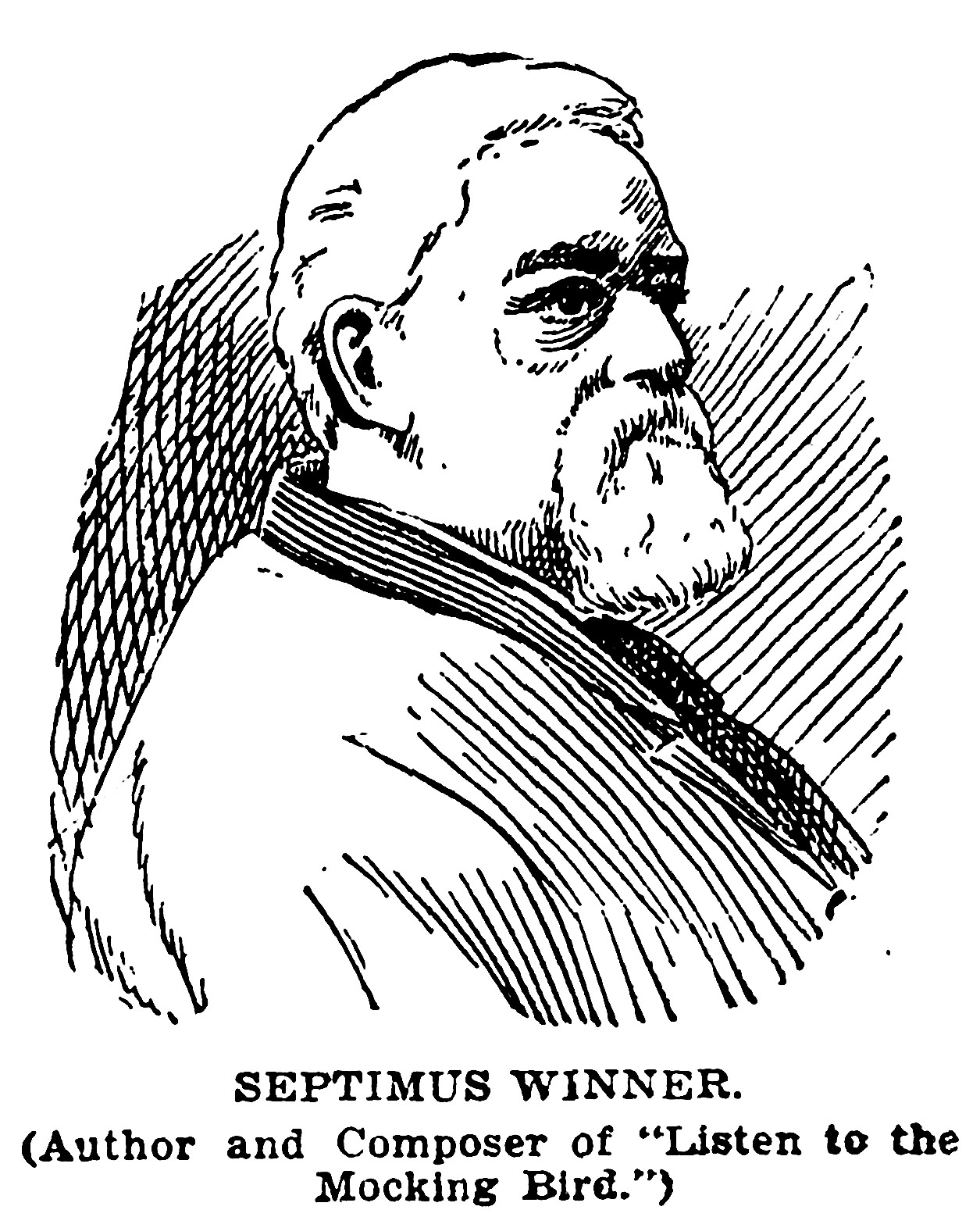Noted Song Maker.
Septimus Winner, Author of “Listen to the Mocking Bird.”
Little Known to the World, Although His Music Has been Sung by Thousands—Hale and Hearty at 74.
At Philadelphia an old man, who celebrated his seventy-fourth birthday last May, is busy just now correcting the manuscript of a new song. At the same time that friends gathered about him last spring to congratulation him on his birthday they also congratulated him because it was the forty-fourth anniversary of the publication of the song, “Listen to the Mocking Bird.”
Mr. Winner has always made his home in Philadelphia. This is Winner's account of hte circumstances under which he wrote the famous “Listen to the Mocking Bird,” as he related it recently to a few friends:
“At the time I wrote the song there was a lively, merry-hearted little colored boy running around the streets of Philadelphia. The boy was always whistling of singing to the accompaniment of a guitar, and I was fond of listening to him. One day I asked him if he would sing a song if I would write it for him. He said that he would, and I wrote ‘Listen to the Mocking Bird,’ set it to music myself and taught it to the boy. It at once became popular and every one was whistling the air of singing the words, and when I published it there was a great demand for it.”
The song was sung all over America and in many parts of Europe. Many of the most noted public singers of the day sang it on the stage, and one such singer in particular, Miss Emma Nevada, has sung it in all parts of the world.

She is so fond of the song that she sought out the author when she was in Philadelphia, and on the occasion of her last visit to that city she invited Mr. Winner to hold a reception with her after a concert she had given.
Those who remember having seen the name of Alice Hawthorne given as the author of the song on its title page will perhaps wonder why this name was given as the author if it was written by Mr. Winner. The explanation is that Mr. Winner wrote a great many of his songs over the pen name of Alice Hawthorne, and sent “Listen to the Mocking Bird” in the world over that name. Another pen name of his is “Mark Mason.” Indeed, most of his songs have been written over names other than his own, which is proof of the fact that modesty is one of Mr. Winter's most marked characteristics.
Soldier boys of the civil war will remember another song of Septimus Winner's that was the sensation of the day when it was first put into circulation, and that was sung around many a camp fire. this once famous old war song was “Give Us Back Our Old Commander.” It was inspired by the removal of Gen. McClellan from the command of the army of the Potomac. The failures of his successors created much criticism and discontent, and this fact suggested the song to Mr. Winner. It voiced the sentiment of thousands of soldier boys who loved McClellan, and the song made such an impression that it attracted the attention of the war department. Some idea of the impression the song made may be had from the fact that the department of war felt called upon to suppress it, and an order went forth forbidding the sale of the song. Mr. Winner was notified by the war department that he would be imprisoned in Fort Lafayette if he continued to sell the song, and public singer, Julia Mortimer, who was singing it with tremendous effect on the stage, was informed that she would be imprisoned if she continued singing it. More than 50,000 copies of the song were sold in Washingotn alone, and its author became one of the most talked-of men of the day. One may be sure that the soldiers did not take kindly to the order forbidding them to sing the song, and the feeling against Gen. Burnside, who had succeeded Gen. McClellan, was stronger than it had been before.
Mr. Winner is also the author of that old-time favorite, “What Is Home Without a Mother?” He wrote also “Whispering Hope,” and many other favorites. Indeed, he is the author of several hundred songs and great many books on musical topics, while his musical arrangements for the piano and violin reach into the thousands.
Noted Song Maker, The Republican,Oakland, Md., December 20, 1900, Vol 24, No. 41, Page 7. (PDF)
This article appeared in a feature called “Current Topics” in several newspapers.